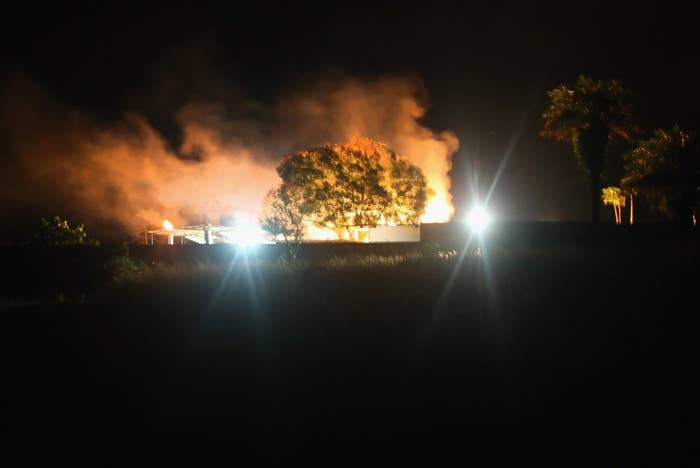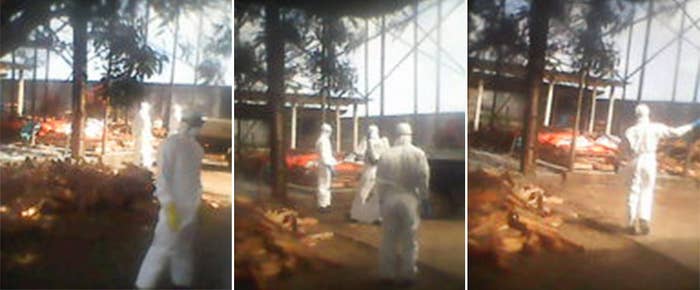
MONROVIA, Liberia — James Dorbor Jallah knows as well as anyone that one part of Liberia's Ebola response raises ire among his fellow Liberians.
Jallah is the deputy incident manager of the response, and the man who runs day-to-day operations at the National Ebola Command Center in Monrovia, the capital. He knows how crucial safely dealing with dead bodies is for controlling the disease. A human body that Ebola has killed can literally crackle with virus, and the dead are the most contagious bodies in the country.
Collecting them safely is probably Liberia's number-one public health concern, and in Montserrado County, where the capital sits, the government policy is that safe collection means cremation. There are too few cemeteries, and too few communities willing to allow mass Ebola graves in their backyards, health officials say, to have given them any other option in the city that became the epicenter of the Ebola outbreak in August and September.
But Jallah also understands, intimately, why Liberians long for something else.
Jallah's father-in-law died last month, after suffering from Parkinson's disease for nine years. His father-in-law lived and died in Bomi County, where there is no cremation facility, and so he was buried like every body in the rest of Liberia is supposed to be now: by a five-man crew in "moon suits," as the personal protective gear is sometimes called.
"We've all seen so much that this was something to be thankful for," Jallah said. "We know where his grave is. My wife and her siblings are happy. At least they have a grave."
In coordination meetings in Monrovia and press conferences in global capitals, a dead Ebola body has had no shortage of attention as a public health threat. But the spiritual afterlife has hardly come up, and when it has, has often been unhelpfully labeled as "superstition" or "traditional belief."
"In a setting where ancestors are so important and where they continue to be actors in the lives of people through memory and codes of behavior and dreams and imagination, if this is not handled properly, it creates a horrendous dilemma for people," said John Janzen, professor emeritus of sociocultural anthropology at University of Kansas and a scholar of healing traditions in western Africa.
And, indeed, it hasn't been handled particularly well. When the sick or the dead are whisked away, it's been common that their relatives are not told what happened to them — even when the body is taken away and burnt.
Those who do know about cremation aren't happy about it. "To hear somebody's relatives have been cremated is like an abomination," said Alexander Blackie, a physician's assistant and a certified mental health worker. In other facets of usual life, people can be coaxed into new behaviors — constant hand-washing, regular temperature-monitoring, the retreat from the famous finger-snapping of the "Liberian handshake."
"Taking someone to be burned," Blackie said, "that thing is a different one."

That's not just because Liberia's 16 different tribes each have differing burial rituals. Those rituals often get summed up as "traditional burial practices," a stodgy, alienating phrase for rites ultimately not that different from what you'd see in many American communities: Someone washes the body (in this case, a community's elders); it gets preserved (in this case, with natural herbs); and the family arrives from across the country to be next to the grave site for the burial.
But cremation doesn't simply deprive families of burial rites, Blackie said. It disturbs the spiritual realm.
"Burning means that the ancestors of the person's spirit are angry with them, that the person doesn't have a resting place within the [spirit] community," Blackie said. If the spirit of the dead is not accepted by the ancestors, he said, it might visit the living, trying to find a place among the rooms and the people of its old, terrestrial life. "If they are moving through the house, they have to be burned so they won't do it again."
Cremation, in Blackie's explanation, is the last straw of the living, seeking to free themselves of the spirit rejected by the ancestors from the afterlife.
So to burn a body, in Liberia, is to jump a lot of spiritual steps.
But Mark Korvayan, who leads one of the Red Cross burial teams in Monrovia and who has been ferrying bodies to the crematory since the earliest days of the outbreak here, understands the policy.
"I have to commend the government for cremation," he said. Korvayan remembers a day back in August when he needed to bury 30 bodies. Land had been secured, he was told, about 30 minutes from Monrovia, but when he got there, the community objected.
Korvayan ended up with less than ideal land. In the height of rainy season, the land had turned swampy, and the day had worn on during the argument with the community. He and his team were working by night to bury the bodies — some of which refused to stay buried in the buoyant soil.
The bodies were later reburied, but they remained objects of interest to the local community. One man told Korvayan he wanted to dig one of them up to inspect the body bag. "I told him, 'I'll give you one for free,'" he said, hoping to quelch his curiosity.
Still, Korvayan erected a plastic fence around the area to discourage others. "And I put fear into them, that if you cross this place, you will bring Ebola into your community," he said.
Liberia's elite, on the other hand, seem keen on wrangling exceptions to the mass cremation rule.
Dr. Samuel Brisbane was Liberia's highest-ranking doctor; when he died of Ebola, in late July, he was buried in a cemetery here. President Ellen Johnson Sirleaf said in an interview in mid-September on the radio station run by the United Nations peacekeeping operation that his burial "was a special one…an exception" and that there is "no pick and choose business" in Ebola deaths.
But similar reports have surfaced in the weeks since. The special assistant to a national medical officer died in late September in an Ebola treatment ward, but his body was somehow released and buried two days later, despite the cremation policy, according to a local obituary.
Korvayan has been asked on more than one occasion to release a body he's come to the Ebola treatment unit (ETU) to pick up, allowing it to be taken away and buried rather than cremated.
"They'll say, 'This is my body and I want it back,'" he said of ETU staff or associates of influential Liberians. "One ETU refused to give me a body because it was a medical doctor," he said, and the ETU staff wanted the doctor to have a burial and grave site.
Another time, he said, a mid-level minister showed up personally to plead on behalf of the body of a deceased friend or associate. "They put it in a casket. It's very, very, very risky," Korvayan said.
At stake in these burial fights is not only spiritual afterlife, but earthly dignity, not just for the dead, but for the living.
"To see your loved ones thrown on top of two, three, four bodies in the back of a truck — it's traumatizing," said Jonathan Enders, a community leader in Soul Clinic, about 45 minutes from Monrovia "Would I want that for my child? Would you?"
